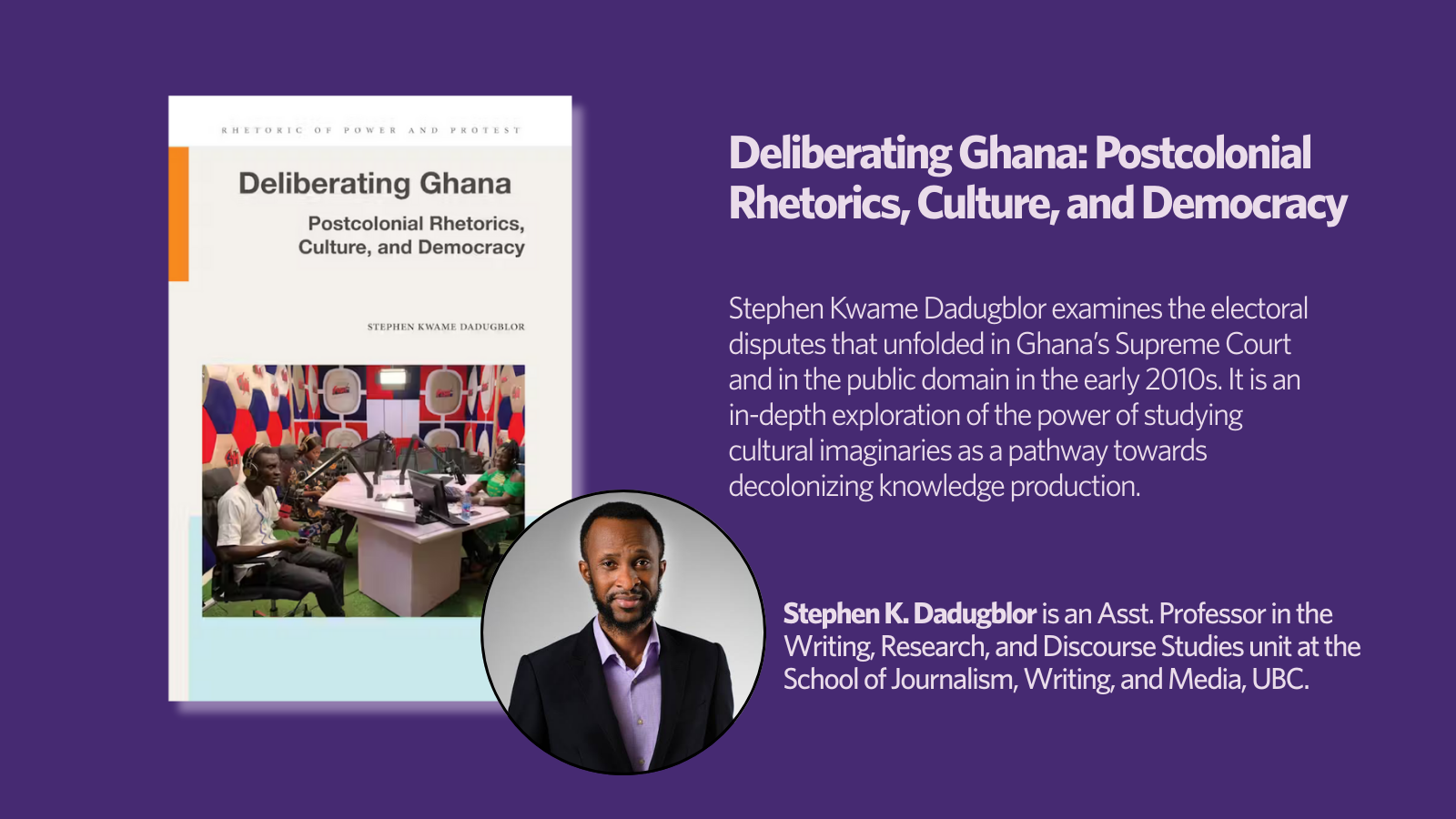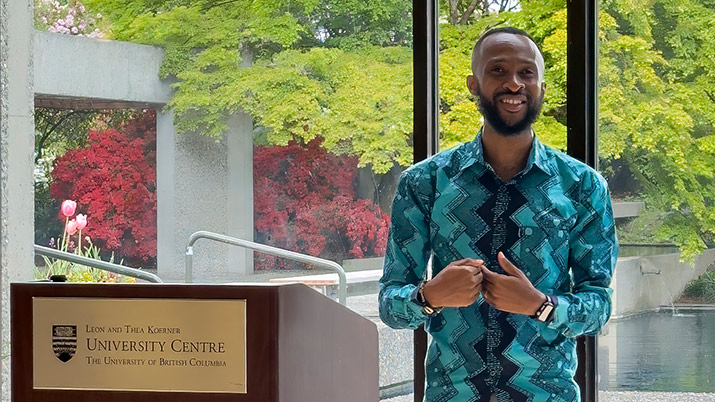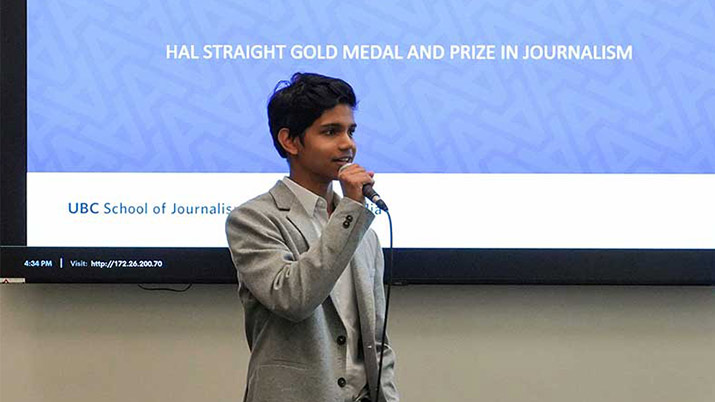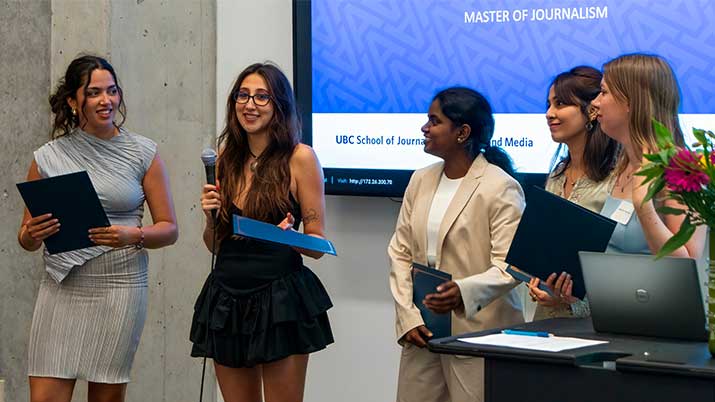Stephen Dadugblor’s new book “Deliberating Ghana: Postcolonial Rhetorics, Culture, and Democracy” is an in-depth exploration of the power of studying cultural imaginaries as a pathway towards decolonizing knowledge production.
We sat down with Dr. Dadugblor to learn more about how rhetoric connects with a cultural imaginaries perspective that takes us beyond a top-down approach to knowledge production.
The book is a must-read for anyone curious about rethinking concepts and ideas associated with democracy. Pick up a discounted copy at the UBC Bookstore today


What is the book about?
In this book I think about the idea of democracy from the perspective of postcolonial countries, focusing specifically on Ghana. I examine democracy and explore a number of related concepts using a case of an election dispute in Ghana from 2013: How do we think about speech in relation to democracy? How do we explore the idea of genre when we think in terms of evidence people may use to bolster their claims to participation? What might be the promises and the perils of digital political participation, especially as digital publics have become quite central to how a lot of people conceive democracy? How are rhetorical practices connected with democracy practice? And then finally, how might we think about the politics of memory and the ways that they connect with democracy? These questions and ideas they generate from the perspective of postcolonial countries can help us think about democracy in different ways beyond Western-centric and East/West conceptions of the practice of a concept that has become so central to how people understand politics and are governed across the world.
How does rhetoric help in better understanding the politics of knowledge generation?
Rhetoric entails the meaning making practices of a people. If we understand rhetoric from that perspective, then we can pay attention to how a particular cultural group understands what makes meaning to them socially and politically. If we understand rhetoric as located within culture and cultures are about how people produce knowledge, then rhetoric inevitably is connected to the cultural imaginaries of a people, and ultimately also connects to knowledge production. Cultural imaginaries would refer to a people’s values, their beliefs, their ways of thinking, their histories, and the messiness of all of these in shaping how they produce knowledge. Rhetoric becomes that route, and connected with cultural imaginaries, it becomes that avenue through which we can understand a people and the ways that they produce knowledge about democracy.
A cultural imaginaries orientation also helps us to move beyond a top-down approach to knowledge production that values certain kinds of knowledges and then devalue others. A cultural imaginaries perspective on rhetoric and democracy as I argue in this book offers us a way of decolonizing entrenched understandings of how a people understand rhetoric, culture, and democracy, and how they ultimately produced knowledge about these.


Dr. Stephen Dadugblor, author, Deliberating Ghana, and Asst. Professor, WRDS, School of Journalism, Writing, and Media
What role does the study of cultural imaginaries play in decolonization?
For a long time, the idea of colonialism was based on the denial that some people have a culture worthy of study, a culture worthy of experience. Cultural imaginaries situate people’s understandings within their values, histories, beliefs, and so on. The moment we begin to locate knowledge production within people’s cultures, then we stand at a vantage point where we can understand their knowledge in relation to colonial knowledges in a way that helps us to unsettle those colonial knowledges. That way as well, we move beyond imposition of colonial knowledges that say some people, their cultures and their experiences, are worth valuing, and then other people’s experiences are not worthy of value or study.
How has this project expanded your horizons as a researcher and a scholarly writer?
This project has forced me think about the ordinary artifacts, for instance, that we encounter in our everyday lives and the significant meanings that these can hold for people. For instance, in one of the chapters in the book, I discuss the idea of genre, focusing on an ordinary two-page document called “pink sheets” for recording election results within the Ghanaian context. This document became central to how the Ghanaian Supreme Court discussed the election dispute case over an eight-month period. Questions of evidence, of truth, of authenticity, and ultimately winner or loser was premised on the design and use of a document like this. And the questions these raised were all quite embedded in issues of literacy, rhetoric, colonialism, and its aftermaths in a place like Ghana.
Thinking through this document, or genre, and the questions it generated forced me to move beyond simply focusing on the familiar text and what it says and toward ideas associated with it and what it can tell us about democracy within postcolonial Ghana.
“Thinking through this document, or genre, and the questions it generated forced me to move beyond simply focusing on the familiar text and what it says and toward ideas associated with it and what it can tell us about democracy within postcolonial Ghana.”
How has using different kinds of sources added to your research?
In approaching a book project of this nature, it is important to look at ideas from a variety of perspectives. I started with courtroom discourse. How did judges and lawyers discuss this case? Now, it would be limiting if I just ended there without considering the vibrant conversations that happened beyond the courtroom context. The courtroom as a state institution can very often be exclusionary of ordinary people’s perspectives.
At the same time that this Supreme Court case was rolling out, citizens were discussing it on digital media platforms, on Facebook, on Twitter and on YouTube videos. So, I analyzed some of those as well, focusing on what they can tell us about political participation. Beyond these digital media platforms, there was the aftermath of the case itself. How did the Ghanaian people wrestle with the idea that after an eight-month period eventually there is a winner to this case and there is a loser? How are they memorializing this case in ways that shape democracy on their own terms, and not as an imposition from somewhere else? How do they remember it in relation to their own histories and practice of politics?
Dr. Stephen Dadugblor
And so, I turned to artifacts of memory like a documentary produced on the case which offered contestable perspectives on political histories in Ghana, the history and memory of the election petition case, and how these ultimately continue to shape the idea of democracy in Ghana. This variety of sources helps me establish a robust case for why a cultural imaginaries perspective on rhetoric and democratic deliberation avails so much for what we can know about a people’s knowledge production practices.
How do you plan to integrate your learnings into your future classes?
One of the chapters from this book is on genre. Because in my WRDS courses, we often talk about the idea of genre as social action and situated practice, I’m looking forward to teaching this chapter as an instance of the importance and the significance of genre for everyday people’s lives, how it can connect to ideas of evidence, legitimacy, and power, and how it can help us to think beyond colonial knowledges sometimes enshrined in written genres that force us to confront the tensions produced in the postcolony when oral forms of knowledge come into contact colonially-inspired written forms of knowledge making. I’m so excited to bring these ideas to my classes and to encourage students to see the connections between rhetoric, genre, and power.
“Because in my WRDS courses, we often talk about the idea of genre as social action and situated practice, I'm looking forward to teaching this chapter as an instance of the importance and the significance of genre for everyday people’s lives, how it can connect to ideas of evidence, legitimacy, and power”


